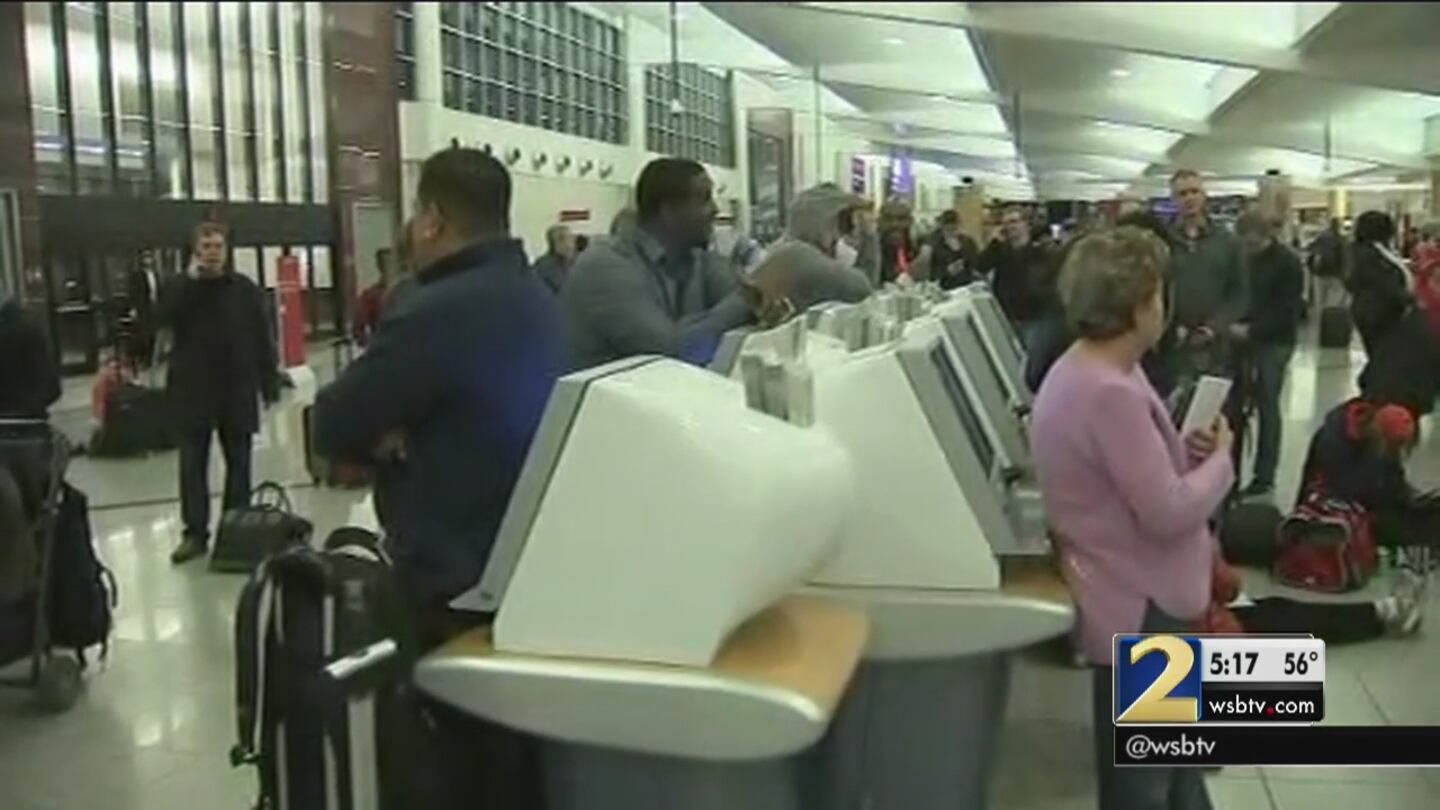ATLANTA — One of the biggest questions travelers in Atlanta and around the country have is how one day of thunderstorms could lead to five days of flight cancellations by Delta Air Lines.
Delta has
cancelled more than 3,300 flights through Sunday
due to thunderstorms that occurred back on Wednesday, and doesn’t expect to get back to normal operations until Monday.
A key problem was that the thunderstorms hitting Atlanta
lasted longer and were more severe than Delta was prepared for
, with waves of storm cells continuing through Wednesday and into the night.
As a result the airline’s schedule of crews and airplanes
was left in disarray and out of position
.
An airline’s flight schedule is typically a logistical ballet of flights, aircraft, pilots, flight attendants and ground crews, each carefully scheduled to interact perfectly as they move on routes around the country and the world.
“You’re matching planes to crews to passengers to locations in an incredibly complex way,” said David Marcontell, general manager of aviation consulting firm Cavok.
TRENDING STORIES:
- Police: Granddaughter, boyfriend suspects in slaying of grandparents
- Coast Guard suspends search for DeKalb man missing from cruise ship
- What will your drive look like for Monday's commute?
But throw in the wrench of an unexpected five-hour ground stop and the ballet screeches to a halt. When the music starts again, the airline is left playing catch up — and unfortunately, Delta spent days stuck in catch-up mode, with some flight operations still out-of-sync and passengers left in the lurch.
Among the factors are safety regulations capping flight crew duty time and requirements for crew rest.
“These are important elements of our overall safety system that we ensure that a crew is alert and able to accomplish the flight in a safe manner,” Marcontell said. A pilot “has got to get that rest.”
That also means flight delays can roll over into subsequent flights and days. If a pilot is supposed to report back to work nine hours after finishing his flight duties in the evening, “if he lands five hours late, he’s by definition going to be leaving at least four hours late” for the next flight, Marcontell said. “You only have a finite number of spare pilots."
With each cancelled or diverted flight, passengers got stuck and another flight’s airplane and crew were left in the wrong part of the country — leading to a domino effect that caused round after round of flight cancellations.
This week’s problem was also exacerbated by a “perfect storm” of complicating factors: A busy Spring break week with many families and children traveling; bad weather disrupting flights in the Northeast and Chicago; and the Masters Tournament in Augusta that left few rental cars available as backup for travelers whose flights were cancelled.
Typically before an expected snowstorm, Delta and other airlines can cancel flights a day or more in advance of the weather threat. That can generate frustration among some travelers, since their itineraries are disrupted before the first snowflake falls.
But for the airline, “proactive cancellations” help to keep passengers from getting stuck at airports, and also helps the airline orchestrate the placement of planes and crews to the best positions around the country to quickly restart operations once a storm has passed.
Delta says thunderstorms, however, are more difficult to predict in severity and length.
“Wednesday’s severe weather was unprecedented for Atlanta and the specific track and intensity of weather like this is often difficult to forecast,” Delta chief operating officer Gil West said in a written statement. “Roughly 60 percent of our 1,250 aircraft fleet cycles through Atlanta on any given day as they arrive from and depart to destinations around the globe. But when weather like we experienced Wednesday hits Atlanta, the resulting impact to Delta’s entire operation can be significant.”
John Hansman, director of MIT’s International Center for Air Transportation, said this type of weather “is very severe weather you really don’t want to fly in.” But in such a situation, “it typically takes an airline three days to a week for all the disruption to basically flow out of the system.”
Delta’s West apologized for the fallout on Thursday. “While we can’t control the weather, we understand the resulting recovery has not been ideal and we apologize for that,” he said in the written statement.
Cox Media Group






